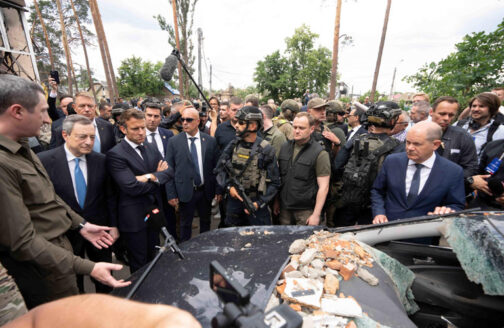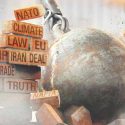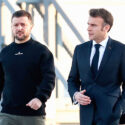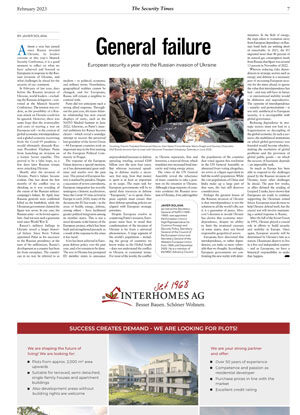General failure
 Touching: French President Emmanuel Macron, then Italian Prime Minister Mario Draghi and German Chancellor Olaf Scholz drove to Kyiv to meet with Ukrainian President Volodymyr Zelensky in June 2022.
Touching: French President Emmanuel Macron, then Italian Prime Minister Mario Draghi and German Chancellor Olaf Scholz drove to Kyiv to meet with Ukrainian President Volodymyr Zelensky in June 2022.
Credit: picture alliance / ZUMAPRESS.com | Ansa/Press Office Chigi'S Palace
European security a year into the Russian invasion of Ukraine
Almost a year has passed since Russia invaded Ukraine. As leaders convene at this year’s Munich Security Conference, it is a good moment to reflect on what we have achieved and learned as Europeans in response to the Russian invasion of Ukraine, and what challenges lie ahead for the security of our continent.
In February of last year, days before the Russian invasion of Ukraine, world leaders – excluding the Russian delegation – convened at the Munich Security Conference. The tension was evident, as the possibility of a Russian attack on Ukraine could not be ignored. However, there was some hope that the irrationality and costs of starting a war on European soil – in the context of global economic interdependence and a global economy recovering from the Covid-19 pandemic – would ultimately dissuade Russian President Vladimir Putin from launching an invasion on a former Soviet republic. This proved to be a false hope, as a few days later Russian troops were attacking Ukraine.
Shortly after the invasion of Ukraine, Putin’s failure became evident. One fact about the first months of the conflict was as shocking as it was revealing of the extent of the Russian military campaign’s failure. By April, four Russian generals were confirmed killed on the battlefield, while the Ukrainian government claimed the figure was seven. In any case, the Russian army – or its Soviet equivalent – had not seen such a gruesome total since World War II.
Russia’s military failings in Ukraine reveal a larger historical failure. Since Boris Yeltsin appointed Putin as his successor to the Russian presidency at the turn of the millennium, Russia’s development as a country has been far from exemplary. The country can in no way be referred to as modern – in political, economic and military terms. Nonetheless, geographical realities cannot be changed, and for Europeans, Russia will remain a neighbor to contend with.
Putin did not anticipate such a strong allied response. Throughout the past year, the trans-Atlantic relationship has seen crucial displays of unity, such as the NATO Madrid Summit in June 2022. Likewise, as Putin’s imperial ambitions for Russia become clearer – which reveal a nostalgic attempt to recover the perceived lost grandeur of the Soviet Union – 44 European countries took an important step in the first meeting of the European Political Community in Prague.
The response of the European Union deserves a special mention, as it has demonstrated great resilience and resolve over the past year. This period of European history is marked by paradox. Despite a succession of severe convulsions, European integration has recently undergone a historic acceleration. Since the Covid-19 virus arrived in Europe in early 2020, many of the decisions the EU has made – in the areas of health, energy, defense, among others – have facilitated greater political integration among its member states. This is not a novel dynamic in the history of the European project, which has been built and strengthened precisely as a result of the response to the crises it has faced.
A lot has been achieved in European defense policy over the past year, and a lot remains to be done. The war in Ukraine has prompted EU member states to announce unprecedented increases in defense spending totaling around €200 billion over the next four years. But whereas increased spending in defense marks a necessary first step, how that money is spent is at least as important as its scope. The main task for European governments will be to spend their resources in defense “Europeanly,” so to speak. European capitals must ensure that their defense-spending policies are aligned with European strategic priorities.
Despite European resolve in countering Putin’s invasion, Europeans must bear in mind that condemnation of the invasion of Ukraine is far from a universal phenomenon. A large segment of the world’s population – including the group of countries we know today as the Global South – does not understand the conflict in Ukraine in existential terms. For most of the world, the conflict in Ukraine represents, first and foremost, a material threat, which translates into increased food insecurity and rising energy prices.
The votes of the UN General Assembly reveal the reluctance of many countries to take a position on the situation in Ukraine. Although a large majority of countries condemn the Russian invasion of Ukraine, if we add together the populations of the countries that voted against this resolution in the UN General Assembly or abstained from voting altogether, we arrive at a figure equivalent to half the world’s population. While the vast populations of China and India make up a large part of that sum, the fact still deserves consideration.
Perhaps the greatest lesson of the Russian invasion of Ukraine is that interdependence is not the solution to all the world’s ills, nor is it a guarantee of peace. Moscow’s decision to invade Ukraine has shown that economic interdependence, despite its ability to limit the irrational excesses of some states, does not breed responsible geopolitical actors.
Europeans have discovered that interdependence, or rather dependencies, can make us more vulnerable than we thought. Accordingly, European governments are confronting this new reality with determination. In the field of energy, the steps taken to transition away from European dependence on Russian fossil fuels are nothing short of remarkable. In 2021, the EU imported more than 40 percent of its natural gas consumption needs from Russia; that figure was around 13 percent in November of 2022.
Whereas reducing risky dependencies in strategic sectors such as energy and defense is a necessary part of increasing European security for the times ahead, to ignore the value that interdependence has had – and may still have in future – in international stability would be dishonest and unproductive. The opposite of interdependence – autarky and protectionism – is not only antithetical to European security, it is incompatible with global governance.
Reducing dependence in strategic sectors must not lead to a fragmentation or decoupling of the global economy. In such a scenario, the multilateral institutions on which global governance was founded would become obsolete, making the resolution of global problems and the provision of global public goods – on which the security of humanity depends – an impossible task.
As much as Europe has been able to respond to the challenges posed by the Russian invasion of Ukraine, many other challenges lie ahead. The past few weeks, as allies debated the sending of Leopard 2 tanks, have shown that Europeans are ready to continue supporting the Ukrainian armed forces. Europeans must do more to help Ukraine defend itself, but the crucial test will involve maintaining a united response to Russia.
After the fall of the Soviet Union in 1991, Ukraine played a crucial role in efforts to build security and stability in Europe. Once again, European security will be determined by Ukraine’s fate as a nation. Ukrainians deserve to live in a free and independent country – and as Europeans, we have a historical responsibility to make that happen.
Javier Solana served as the Secretary-General of NATO (1995–1999), was appointed the European Union’s High Representative for Common Foreign and Security Policy, Secretary-General of the Council of the European Union and Secretary-General of the Western European Union from 1999 until December 2009. He is a member of the MSC Advisory Council.




